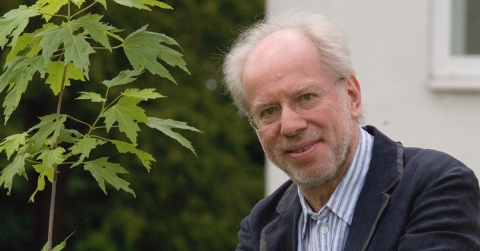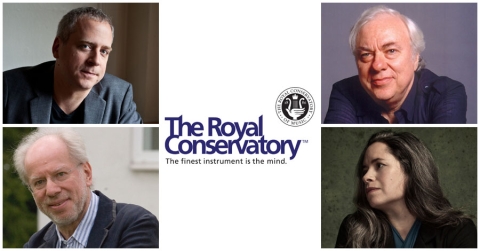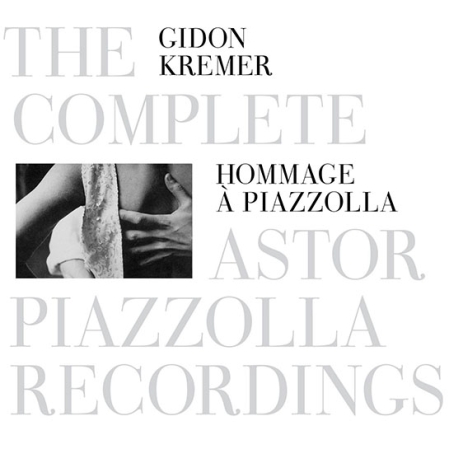Honoring Kremerata Baltica's sixth anniversary, violinist Kremer and his ensemble perform, with wit and virtuosity, variations on such celebratory themes as "Happy Birthday" and "Auld Lang Syne." "Beautifully programmed and beautifully played," says the Boston Herald, "Kremer's Happy Birthday is the best present you could ask for."
Gidon Kremer, in describing Happy Birthday, his 2003 album with Kremerata Baltica, said, “Our intention has always been to awaken the listener by a kind of shock to the senses, which, in this case, is a humorous one; to make him or her aware that music is able to not only glide easily on the surface of our senses, but also permeate more deeply, enriching us (the listeners) with emotions, fantasies, laughter and insights.”
Although the works on Happy Birthday share seemingly transparent origins, the performances reveal a new sensibility, unexpected elegance, naïve playfulness and exquisite virtuosity. They not only afford us the pleasure of recognition, but also serve to nudge us out of our listening rut, by hearing familiar themes in unaccustomed ways.
In the title track, the world’s most familiar theme is given eleven new sets of stylistic clothes in variations by Peter Heidrich. Tunes such as Auld Lang Syne (in variations by Franz Waxman) and God Save the King are re-interpreted as well, offset by less expected works such as Alfred Schnittke’s PolkaElegy. The juxtaposition of works on and Tchaikovsky’s Happy Birthday is a gallant flirtation with cultural memory and collective perception. It affords the listener the opportunity to listen in startlingly new ways, with equal parts virtuosity and good humor.
Kremerata Baltica, whom the Los Angeles Times calls “extraordinary young players ... [who] animate everything their bows touch,” was founded by Gidon Kremer in 1996. An orchestra of young musicians from the three Baltic States, they first performed in Riga, Latvia in February 1997 and have gone on to tour throughout the world. Kremerata Baltica recently signed an exclusive, six-record agreement with Nonesuch Records, inaugurated in 2000 with the release of Eight Seasons, a re-orchestration of Piazzolla’s Cuatro estaciones porteñas paired with the Vivaldi classic. The group went on to release the Grammy Award-winning recording After Mozart in 2001, followed by a recording of two works by Enescu in 2002 to much critical acclaim.
PRODUCTION CREDITS
Produced by Helmut Mühle and Gidon Kremer
Edited by Gudrun Maurer
Engineer: Philipp Nedel
Assistant Engineer: Niels Müller
Except tracks 2-13, Engineer: Peter Laenger (Tritonus)
Track 18, Engineer: Niels Müller; Assistant Engineer: Sibylle Strobel
Track 1 recorded December 2001 at Studio Nalepastraße, Berlin; tracks 2-13 recorded June 1999 at Reitschule, Grafenegg; tracks 14-17 & 19-25 recorded September 1999 at Jesus Christus Kirche, Berlin; track 18 recorded November 2001 at Probesaal der Staatsphilharmonie Rheinland-Pfalz, Ludwigshafen
Production Coordinators: Matteo Tradardi and Sonia Simmenauer
Design by Evan Gaffney
Cover image by Trujillo/Paumier – Getty Images
Executive Producer: Robert Hurwitz
79657
MUSICIANS
Gidon Kremer, violin
Ula Ulijona, viola
Marta Sudraba, cello
Vato Kakhidze, piano, vocals
Louis Lortie, piano
Kremerata Baltica:
Violin: Indre Andruskeviciute, Dzeraldas Bidva, Eva Bindere, Migle Diksaitiene, Andrejs Golikovs, Inga Gylyte, Elo Ivask, Miroslava Kotorovytch, Ruta Lipinaityte, Lasma Mucenice, Marija Nemanyte, Migle Serapinaite, Sandis Steinbergs, Andrei Valigura, Rasa Vosyliute, Sanita Zarina
Viola: Janis Lielbardis, Vidas Vekerotas, Kaspars Vilnitis, Ula Ulijona, Zita Zemovica, Guy Ben Ziony
Cello: Peteris Cirksis, Giedre Dirvanauskaite, Ilze Grudule, Eriks Kirsfelds, Marta Sudraba
Bass: Danielis Rubinas, Indrek Sarrap
Harpsichord/Piano: Reinut Tepp
Percussion: Andrey Pushkarev

















